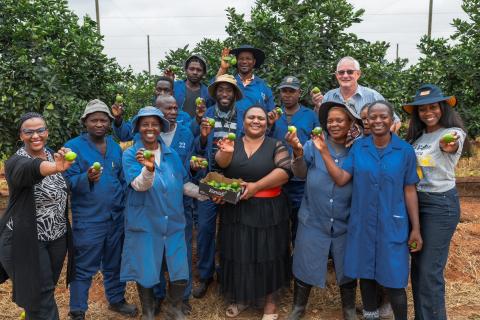
Alcohol distribution company owner Alistair Shapiro is not going to let the third alcohol sales ban grind his business and lifeblood to a halt.
Not two days after the announcement of the third ban on the sale of alcohol which took effect as of 29 December 2020, and owner of Shapiro Distributors, Alistair Shapiro was forced to call an emergency meeting with his employees.
Once the ban had been announced, Alistair candidly informed his colleagues and friends that if the prohibition on the sale of alcohol is not lifted by 15 January 2021 then he would have no choice by to retrench his entire workforce.
“Each day one of my trucks stands idle costs me money. I have to pay my staff, pay for insurance, and pay for vehicle rental. Yet another alcohol sales ban means I cannot cover these overheads and it’s sinking my business fast.”
For Alistair, the only hope for his business, himself and his employees is for alcohol sales to resume so they can once again start making deliveries and making a living.
On Tuesday 5 January 2021, Alistair joined forces with the South African Breweries (SAB) to challenge the constitutionality of the alcohol ban.
Why Alistair? Even though his business is completely independent, its growth is intrinsically linked to SAB as a member of the brewery’s owner-driver programme – a transformation initiative designed to give previously disadvantaged individuals like Alistair the opportunity to participate in, and benefit from, the lucrative transport industry.
Even though the owner-driver is contracted to SAB, he does so as an independent contractor. To the extent that an owner-driver employs drivers and/or crewman, they are the employees of the owner-driver. As such the owner-driver also bears the cost of vehicle maintenance, repairs and insurance irrespective of whether the vehicle is owned by the owner-driver, or rented from SAB.
“The business I have grown over the past 13 years is my greatest pride. It is heart-breaking for a business owner to watch his business gasp for air; more so when it is for reasons entirely out of his control. The prohibition on the sale of alcohol will make it impossible for my business to survive,” lamented Alistair.
The renewed prohibition on the sale of alcohol announced on 28 December 2020 closed the doors of his business for a third time this year. Only a few days after the announcement and Alistair was able to do some business collecting returnable empty containers (“empties”) from retailers and transporting them back to the depot. However, once all the empties have been collected, this remaining business dries up.
One could argue that Alistair could simply start distributing other goods to remain in business. He says the transport of alcoholic products requires a vehicle that is specially modified for that purpose. The trucks used by the owner-drivers are fit for the sole purpose of transporting alcohol and cannot be re-purposed to transport persons or any other commodities. Not to mention that the crewmen who work on these trucks are specially trained to – firstly – work on these kinds of modified trucks and – secondly – to haul, pack and unpack alcoholic products specifically.
“I have implored my staff to accept any other job opportunities if they do arise because my business has probably only two weeks left to live,” said Alistair.
As a partner in this constitutional challenge, SAB believes this is the last resort available to protect its employees, suppliers, customers, consumers and all the lives it supports. Although SAB stands behind measures to fight against the Covid-19 pandemic, these must also protect the economy and the constitution.
What constitutional grounds does Shapiro have to stand on? The constitution guarantees all South Africans the right to freely partake in their chosen trade or profession. Legally speaking, the government should not unjustifiably make that choice to trade unlawful, undesirable, difficult, or unprofitable.
“The constitution affords me the right to freely choose my trade or profession. This means that the government should not be allowed to unjustifiably turn my business into a criminal enterprise at the click of their fingers,” said Alistair.
It was in 2008 that Alistair chose to build his first business in the alcoholic beverages industry. Since then he has not only remained in the industry since the beginning of his career, but he has also built several other businesses which rely directly on it.
“This has remained my chosen choice of trade for over a decade, during which time I have been able to pursue this trade both profitably and legally. The government’s varying restrictions on the sale of alcohol, however, has made the legal and profitable pursuit of my trade impossible”. In terms of the law, if the government wishes to continue to apply this ban on the sale of alcoholic beverages it needs to demonstrate that the decision to do so is justifiable in terms of the Constitution.
The constitution states that rights may be limited by a law of general application that is 'reasonable and justifiable in an open and democratic society based on dignity, freedom, and equality'.
“For our rights to be taken away from me and the hundreds of other alcohol distributors without warning or consultation is simply unjustifiable. We should all be fighting to see the ban declared unconstitutional and our incomes restored,” said Alistair.



